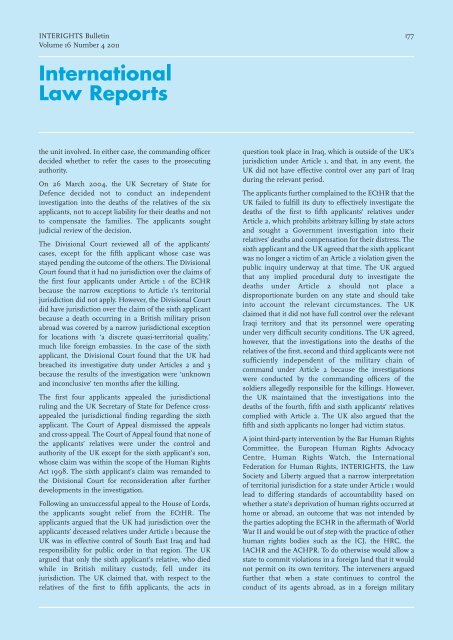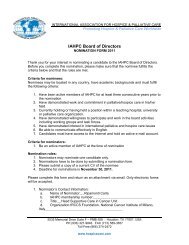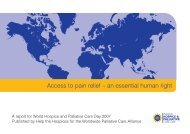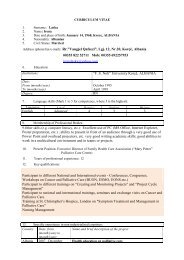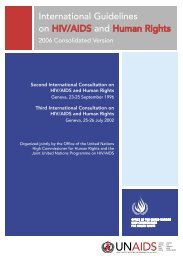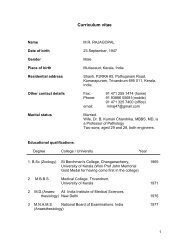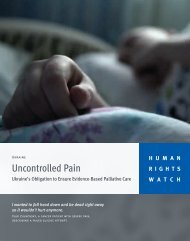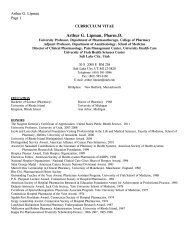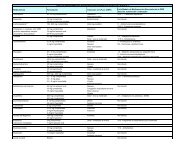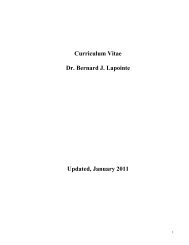INTERIGHTS Bulletin
INTERIGHTS Bulletin
INTERIGHTS Bulletin
Create successful ePaper yourself
Turn your PDF publications into a flip-book with our unique Google optimized e-Paper software.
<strong>INTERIGHTS</strong> <strong>Bulletin</strong><br />
Volume 16 Number 4 2011<br />
177<br />
International<br />
Law Reports<br />
the unit involved. In either case, the commanding officer<br />
decided whether to refer the cases to the prosecuting<br />
authority.<br />
On 26 March 2004, the UK Secretary of State for<br />
Defence decided not to conduct an independent<br />
investigation into the deaths of the relatives of the six<br />
applicants, not to accept liability for their deaths and not<br />
to compensate the families. The applicants sought<br />
judicial review of the decision.<br />
The Divisional Court reviewed all of the applicants’<br />
cases, except for the fifth applicant whose case was<br />
stayed pending the outcome of the others. The Divisional<br />
Court found that it had no jurisdiction over the claims of<br />
the first four applicants under Article 1 of the ECHR<br />
because the narrow exceptions to Article 1’s territorial<br />
jurisdiction did not apply. However, the Divisional Court<br />
did have jurisdiction over the claim of the sixth applicant<br />
because a death occurring in a British military prison<br />
abroad was covered by a narrow jurisdictional exception<br />
for locations with ‘a discrete quasi-territorial quality,’<br />
much like foreign embassies. In the case of the sixth<br />
applicant, the Divisional Court found that the UK had<br />
breached its investigative duty under Articles 2 and 3<br />
because the results of the investigation were ‘unknown<br />
and inconclusive’ ten months after the killing.<br />
The first four applicants appealed the jurisdictional<br />
ruling and the UK Secretary of State for Defence crossappealed<br />
the jurisdictional finding regarding the sixth<br />
applicant. The Court of Appeal dismissed the appeals<br />
and cross-appeal. The Court of Appeal found that none of<br />
the applicants’ relatives were under the control and<br />
authority of the UK except for the sixth applicant’s son,<br />
whose claim was within the scope of the Human Rights<br />
Act 1998. The sixth applicant’s claim was remanded to<br />
the Divisional Court for reconsideration after further<br />
developments in the investigation.<br />
Following an unsuccessful appeal to the House of Lords,<br />
the applicants sought relief from the ECtHR. The<br />
applicants argued that the UK had jurisdiction over the<br />
applicants’ deceased relatives under Article 1 because the<br />
UK was in effective control of South East Iraq and had<br />
responsibility for public order in that region. The UK<br />
argued that only the sixth applicant’s relative, who died<br />
while in British military custody, fell under its<br />
jurisdiction. The UK claimed that, with respect to the<br />
relatives of the first to fifth applicants, the acts in<br />
question took place in Iraq, which is outside of the UK’s<br />
jurisdiction under Article 1, and that, in any event, the<br />
UK did not have effective control over any part of Iraq<br />
during the relevant period.<br />
The applicants further complained to the ECtHR that the<br />
UK failed to fulfill its duty to effectively investigate the<br />
deaths of the first to fifth applicants’ relatives under<br />
Article 2, which prohibits arbitrary killing by state actors<br />
and sought a Government investigation into their<br />
relatives’ deaths and compensation for their distress. The<br />
sixth applicant and the UK agreed that the sixth applicant<br />
was no longer a victim of an Article 2 violation given the<br />
public inquiry underway at that time. The UK argued<br />
that any implied procedural duty to investigate the<br />
deaths under Article 2 should not place a<br />
disproportionate burden on any state and should take<br />
into account the relevant circumstances. The UK<br />
claimed that it did not have full control over the relevant<br />
Iraqi territory and that its personnel were operating<br />
under very difficult security conditions. The UK agreed,<br />
however, that the investigations into the deaths of the<br />
relatives of the first, second and third applicants were not<br />
sufficiently independent of the military chain of<br />
command under Article 2 because the investigations<br />
were conducted by the commanding officers of the<br />
soldiers allegedly responsible for the killings. However,<br />
the UK maintained that the investigations into the<br />
deaths of the fourth, fifth and sixth applicants’ relatives<br />
complied with Article 2. The UK also argued that the<br />
fifth and sixth applicants no longer had victim status.<br />
A joint third-party intervention by the Bar Human Rights<br />
Committee, the European Human Rights Advocacy<br />
Centre, Human Rights Watch, the International<br />
Federation for Human Rights, <strong>INTERIGHTS</strong>, the Law<br />
Society and Liberty argued that a narrow interpretation<br />
of territorial jurisdiction for a state under Article 1 would<br />
lead to differing standards of accountability based on<br />
whether a state’s deprivation of human rights occurred at<br />
home or abroad, an outcome that was not intended by<br />
the parties adopting the ECHR in the aftermath of World<br />
War II and would be out of step with the practice of other<br />
human rights bodies such as the ICJ, the HRC, the<br />
IACHR and the ACHPR. To do otherwise would allow a<br />
state to commit violations in a foreign land that it would<br />
not permit on its own territory. The interveners argued<br />
further that when a state continues to control the<br />
conduct of its agents abroad, as in a foreign military


